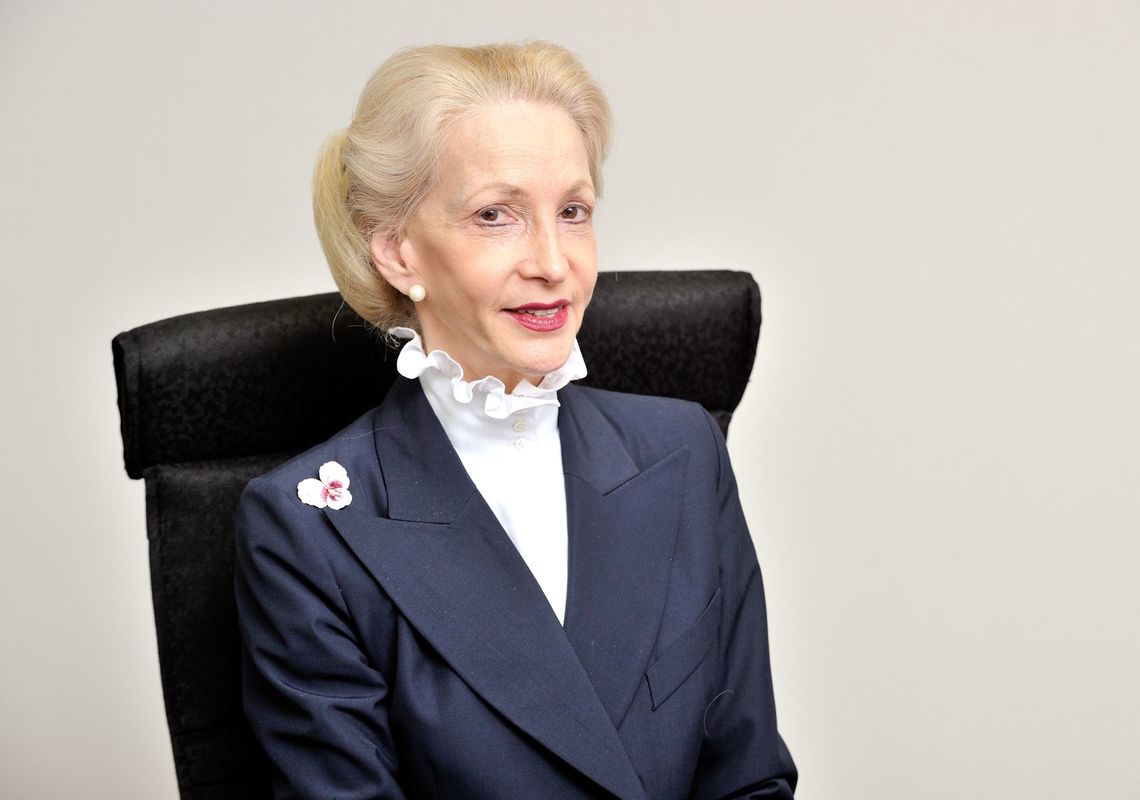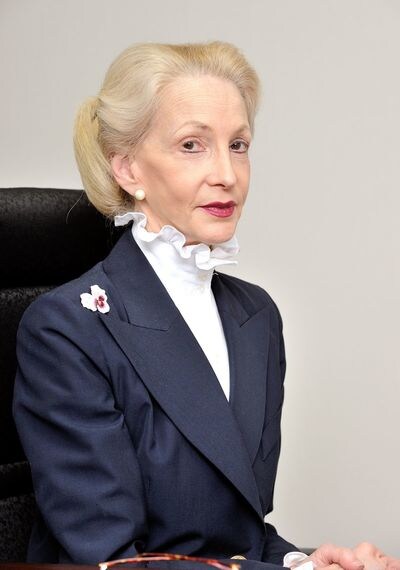
You could feel her austere presence the moment she entered the room. Dressed in her trademark high-collared white shirt and black fitted jacket, Lady Barbara Judge has nothing if not a commanding presence. This presence is something you might expect from the first woman to have served as chairman of the United Kingdom’s Atomic Energy Commission, but appearances can be deceptive: her charming, down-to-earth and somewhat eccentric manner was pleasantly disarming.
Born and raised in New York, Lady Judge started her career as a corporate lawyer before going on to serve as a member of the U.S. Securities and Exchange Commission (SEC), chairman of the U.K.’s Pensions Protection Fund (PPF) and numerous other prestigious positions. She received a knighthood in 2010 and now resides in London.
Three years have passed since she became deputy chairman of Tokyo Electric Power Corp’s (TEPCO) Nuclear Reform Monitoring Committee, where she provides guidance on how to restore public confidence in the organization since its notorious mishandling of the 2011 Fukushima disaster. We asked about her accomplishments, goals and the problems that she has faced in improving the image of this beleaguered and heavily-criticized organization.
First of all, what motivated you to take a role as deputy chairman of TEPCO’s Nuclear Monitoring Committee?
I had been chairman of the U.K. Atomic Energy Authority. In that role, I had played a large part in convincing the U.K. government and the general public that the U.K. needed nuclear power--particularly in the context of the three most important energy issues. The issues are energy security, energy independence and climate change. In my opinion, the only kind of energy that answers all those questions is nuclear.
If you have nuclear power in your own country, you can have as much energy as you want. And you don’t have to buy it from any other country, so you have independence and security. We all know that nuclear does not emit carbon.
Having spent so much time in England working on the project of helping the British people be secure and independent, I was particularly honored, actually, to be asked to help the Japanese people, especially because I have a long history with Japan.
Can you give us an example of how exactly you leveraged your past experience for the last three years at the committee?
First of all, I believe that one of the things I could do was help TEPCO improve their communication. TEPCO is filled with engineers, and they only want to talk to the public when they know all the facts. Today, with Internet and real-time reporting, there is no time to wait for all the facts.
They were doing two things that were not appropriate. First, they were waiting too long to bring out the facts until they knew them all and the public was unhappy. The public felt they didn’t get anything fast enough. Second, when we told them to give the facts as soon as they had them, they just gave so much information to the public that the public couldn’t understand it.
I think I helped them understand that they had to give the information in a timely fashion, but in words that ordinary people could understand--and put the information in a context that they could absorb it. I think because I’m not an engineer, I could read what they were writing and help write it in a way that intelligent people, but not engineers, could understand the situation. That is what I did in the U.K. and all over the world.
Also, I thought it was necessary to have a woman. We know in the U.K., and in America, and in France, and in Japan that the most vocal people against nuclear energy are women. I wanted to have a woman’s voice to explain the benefits of nuclear energy; from one woman, one mother to another mother. A business woman, and a lawyer, and a mother and somebody that believes in nuclear is not so easy to find in Japan.
Too much is too little
Do you think that you have actually helped them, more Japanese women, understand, and that they will appreciate the benefits of nuclear energy?
I hope so. I also hope that the fact that TEPCO asked a woman to join this important committee shows that the leadership at TEPCO was being very brave and forward-looking and modern. TEPCO itself, by appointing me, was taking into account the fact that women are concerned. It reflects very well on them as a company when they were setting up the committee.
Do you think TEPCO’s communication has become better?

Much. In the beginning, it was very hard, even for me, to understand what the complexities of water management were--what the complexities of the problem were--because the way the press releases were drafted was too technical. When I was at the SEC a long time ago, we used to say, sometimes full disclosure is no disclosure.
Too much is too little. Now more and more, the disclosure is faster, but easier to understand and in context, explaining to ordinary people what the figures and the facts mean.
What about TEPCO’s communication with the international community? I remember people outside of Japan were so scared after the Fukushima disaster because TEPCO almost had no communication with media outside Japan.
You’re exactly right. Right after the Fukushima [disaster], nobody knew what was going on outside of Japan, maybe not even in Japan. I don’t think TEPCO was focused on communication then. They were focused on cleaning up what was happening. They weren’t used to international communication. It wasn’t part of their norm.
Before the accident, TEPCO and many of the other utilities didn’t particularly do international communication. It wasn’t until the world started to focus on Japan because of the accident that TEPCO even needed to consider international communication.
One of the things the Reform Committee did was explain to TEPCO that the eyes of the world were on it and they would have to make efforts to explain to the outside world what was happening in Japan. They started to learn, but it was slow. They’re getting much better at it now.
TEPCO’s management has made it clear that it wants to restart its nuclear reactors in Niigata (Kashiwazaki Kariya) in order to meet the energy demand in the area it serves. At the same time, TEPCO has been saying it will wrangle an agreement from the city of Kashiwazaki and the general public although that seems to be impossible. How long do you think TEPCO should wait before it actually restarts the reactors?
I wouldn’t want to take that. I think it would be presumptuous for me to say. I think it’s the government and Japan’s Nuclear Regulation Authority (NRA), together with the utility industry, who should determine the best time. The most important thing is for the NRA to determine that the reactors are safe and passing their very high standards.
I think it’s very important for the public to understand that the NRA is very independent and it has put in the highest safety standards. Any nuclear power plant that passes the NRA’s standards--that reaches them--is by definition at a very high safety standard.
Decommissioning is an opportunity
In past interviews, you have said that the decommissioning part of TEPCO’s business should be separated from TEPCO. Do you still think so?
Not out of TEPCO, just in a separate division. I think they took my advice because they have separated into a separate division.
I was chairman of the Atomic Energy Authority, and we were decommissioning this. Decommissioning is a different skill, and it requires different abilities from its management and its personnel. It’s very important. What I believe is that the people who are doing decommissioning should focus on that job, which has a lot of intrinsic value, but it does not require same skill as running a nuclear power plant.
My opinion about decommissioning is that it’s an opportunity to make a lot of innovations which will benefit the world--the whole world. I have thought about this a lot because I was doing decommissioning before.
Even without the accident, there are many nuclear power plants around the world that are nearing the end of their useful life. They are the first generation of nuclear power and they will all need to be decommissioned in the next 20 years. There’s a real business and skill to decommissioning nuclear power plants safely and on time.
Because Japan has such great nuclear expertise, like Toshiba, Hitachi and Mitsubishi, heavy industries as well as TEPCO, and the other utilities, and they will all work together to bring innovative solutions to very hard problems.
You’ve become a board member of LIXIL. What do you think the company expects from you?
First of all, you know there’s a new corporate governance code. The new corporate governance code suggests that there should be at least two outside directors.
You also know that the Prime Minister has said that women should be more involved in business for the good of the country. The leadership at LIXIL, I believe, is very forward-looking and advanced, and very much a believer in good corporate governance. In addition, LIXIL is a global company and it’s going to be more and more global.
What’s your opinion on overall corporate governance practice in Japanese companies?
Corporate governance in Japan is on a journey, and it’s at the beginning--but it’s going in the right direction. The number of outside directors has been increasing every year, and there are few women--some--and a few foreigners, but not many. There is a move toward committee governance, and it’s just starting.
I think the fact that the government and the Prime Minister is behind it gives it a very good push. I think it’s important for Japan because global investors, which is what Japan is looking for, want to invest in companies that have good corporate governance.



